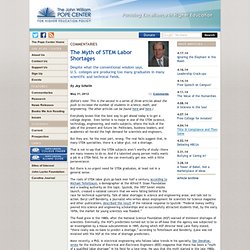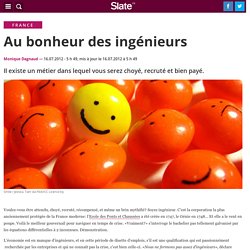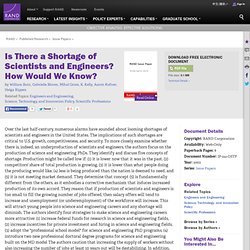

Marché du travail. The John William Pope Center for Higher Education Policy. May 31, 2012 (Editor's note: This is the second in a series of three articles about the push to increase the number of students in science, math, and engineering.

The other articles can be found here and here.) Everybody knows that the best way to get ahead today is to get a college degree. Even better is to major in one of the STEM (science, technology, engineering, and math) subjects, where the bulk of the jobs of the present and future lie. Politicians, business leaders, and academics all herald the high demand for scientists and engineers. But they are, for the most part, wrong. That is not to say that the STEM subjects aren’t worthy of study—there are many reasons to do so. But there is no urgent need for STEM graduates, at least not in a general sense. The roots of STEM labor gluts go back over half a century, according to Michael Teitelbaum, a demographer at the Alfred P.
The apparent misinformation continues to this day. STEM Jobs 101: Supply and Demand Where Will the STEM JOBS Be? Au bonheur des ingénieurs. Voulez-vous être attendu, choyé, recruté, récompensé, et même un brin mythifié?

Soyez ingénieur. C’est la corporation la plus anciennement protégée de la France moderne: l’Ecole des Ponts et Chaussées a été créée en 1747, le Génie en 1748… Et elle a le vent en poupe. Voilà le meilleur gouvernail pour naviguer en temps de crise. «Vraiment?» S’interroge le bachelier pas tellement galvanisé par les équations différentielles à 2 inconnues. L’économie est en manque d’ingénieurs, et en cette période de disette d’emplois, s’il est une qualification qui est passionnément recherchée par les entreprises et qui ne connaît pas la crise, c’est bien celle-ci. L’édition 2012 de l’enquête BMO (besoin de main d’œuvre, PDF) signale que le projet de recrutements d’ingénieurs s’accélère avec une demande accrue pour le domaine du numérique (informatique, télécoms, internet): une demande qui repart à la hausse après avoir fléchi en 2008-2009 en raison de la crise.
Les ingénieurs français s'exportent [1] cf. Is There a Shortage of Scientists and Engineers? How Would We Know? Over the last half-century, numerous alarms have sounded about looming shortages of scientists and engineers in the United States.

The implications of such shortages are critical to U.S. growth, competitiveness, and security. To more closely examine whether there is, indeed, an underproduction of scientists and engineers, the authors focus on the production of science and engineering PhDs. They identify and discuss five concepts of shortage. Production might be called low if: (1) it is lower now that it was in the past, (2) competitors' share of total production is growing, (3) it is lower than what people doing the producing would like, (4) less is being produced than the nation is deemed to need, and (5) it is not meeting market demand.
They determine that concept (5) is fundamentally different from the others, as it embodies a corrective mechanism that induces increased production of its own accord. This report is part of the RAND Corporation issue paper series. Kim Adams: Engineering Workforce Shortages + The Opportunity Equation.